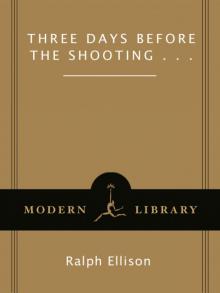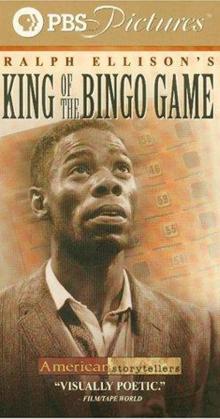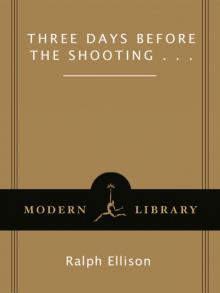- Home
- Ralph Ellison
Invisible Man
Invisible Man Read online
Invisible Man
Ralph Ellison
To Ida
Contents
Introduction
Prologue
Chapter one
Chapter two
Chapter three
Chapter four
Chapter five
Chapter six
Chapter seven
Chapter eight
Chapter nine
Chapter ten
Chapter eleven
Chapter twelve
Chapter thirteen
Chapter fourteen
Chapter fifteen
Chapter sixteen
Chapter seventeen
Chapter eighteen
Chapter nineteen
Chapter twenty
Chapter twenty-one
Chapter twenty-two
Chapter twenty-three
Chapter twenty-four
Chapter twenty-five
Epilogue
Introduction
What, if anything,
is there that a novelist can say about his work that wouldn’t be better left to the critics? They at least have the advantage of dealing with the words on the page, while for him the task of accounting for the process involved in putting them there is similar to that of commanding a smoky genie to make an orderly retreat—not simply back into the traditional bottle, but into the ribbon and keys of a by now defunct typewriter. And in this particular instance all the more so, because from the moment of its unexpected inception this has been a most self-willed and self-generating piece of fiction. For at a time when I was struggling with a quite different narrative it announced itself in what were to become the opening words of its prologue, moved in, and proceeded to challenge my imagination for some seven years. What is more, despite its peacetime scenery it erupted out of what had been conceived as a war novel.
It all began during the summer of 1945, in a barn in Waitsfield, Vermont, where I was on sick leave from service in the merchant marine, and with the war’s end it continued to preoccupy me in various parts of New York City, including its crowded subways: In a converted 141st Street stable, in a one-room ground-floor apartment on St. Nicholas Avenue and, most unexpectedly, in a suite otherwise occupied by jewelers located on the eighth floor of Number 608 Fifth Avenue. It was there, thanks to the generosity of Beatrice and Francis Steegmuller, then spending a year abroad, I discovered that writing could be just as difficult in a fellow writer’s elegant office as in a crowded Harlem apartment. There were, however, important differences, some of which worked wonders for my shaky self-confidence and served, perhaps, as a catalyst for the wild mixture of elements that went into the evolving fiction.
The proprietors of the suite, Sam and Augusta Mann, saw to it that I worked undisturbed, took time off for lunch (often at their own expense) and were most encouraging of my efforts. Thanks to them I found myself keeping a businessman’s respectable hours, and the suite’s constant flow of beautiful objects and its occupants’ expert evaluations of pearls and diamonds, platinum and gold gave me a sense of living far above my means. Thus actually and symbolically the eighth floor was the highest elevation upon which the novel unfolded, but it was a long, far cry from our below-street-level apartment and might well have proved disorienting had I not been consciously concerned with a fictional character who was bent upon finding his way in areas of society whose manners, motives and rituals were baffling.
Interestingly enough, it was only the elevator operators who questioned my presence in such an affluent building, but this, after all, was during a period when the doormen of buildings located in middle- and upper-class neighborhoods routinely directed such as myself to their service elevators. I hasten to add, however, that nothing of the kind ever happened at 608, for once the elevator men became accustomed to my presence they were quite friendly. And that was true even of the well-read immigrant among them who found the idea of my being a writer quite amusing.
By contrast, certain of my St. Nicholas Avenue neighbors considered me of questionable character. This, ostensibly, was because Fanny, my wife, came and went with the regularity of one who held a conventional job while I was often at home and could be seen at odd hours walking our Scottish terriers. But basically it was because I fitted none of the roles, legal or illegal, with which my neighbors were familiar. I was neither a thug, numbers-runner, nor pusher, postal worker, doctor, dentist, lawyer, tailor, undertaker, barber, bartender nor preacher. And, while my speech revealed a degree of higher education, it was also clear that I was not of the group of professionals who lived or worked in the neighborhood. My indefinite status was therefore a subject of speculation and a source of unease, especially among those whose attitudes and modes of conduct were at odds with the dictates of law and order. This made for a nodding relationship in which my neighbors kept their distance and I kept mine. But I remained suspect, and one snowy afternoon as I walked down a shady street into the winter sunshine a wino lady let me know exactly how I rated on her checklist of sundry types and characters.
Leaning blearily against the façade of a corner bar as I approached, and directing her remarks at me through her woozy companions, she said, “Now that nigger there must be some kinda sweetback, ’cause while his wife has her some kinda little ‘slave,’ all I ever see him do is walk them damn dogs and shoot some damn pictures!”
Frankly, I was startled by such a low rating, for by “sweetback” she meant a man who lived off the earnings of a woman, a type usually identified by his leisure, his flashy clothes, flamboyant personal style and the ruthless business enterprise of an out-and-out pimp—all qualities of which I was so conspicuously lacking that she had to laugh at her own provocative sally. However the ploy was intended to elicit a response, whether angry or conciliatory she was too drunk or reckless to care as long as it threw some light into the shadows of my existence. Therefore I was less annoyed than amused, and since I was returning home with fifty legally earned dollars from a photographic assignment I could well afford to smile while remaining silently concealed in my mystery.
Even so, the wino lady had come fairly close to one of the economic arrangements which made my writing a possibility, and that too is part of the story behind this novel. My wife did indeed provide the more dependable contributions to our income while mine came catch-as-catch-can. During the time the novel was in progress she worked as a secretary for several organizations and was to crown her working career as the executive director of the American Medical Center for Burma, a group that supported the work of Dr. Gordon S. Seagrave, the famous “Burma Surgeon.” As for myself, I reviewed a few books, sold a few articles and short stories, did free-lance photography (including book-jacket portraits of Francis Steegmuller and Mary McCarthy), built audio amplifiers and installed high-fidelity sound systems. There were also a few savings from my work on ships, a Rosenwald grant and its renewal, a small publisher’s advance and, for a while, a monthly stipend from our friend and patron of the arts, the late Mrs. J. Caesar Guggenheimer.
Naturally our neighbors knew nothing of this, and neither did our landlord, who considered writing to be such a questionable occupation for a healthy young man that during our absence he was not above entering our apartment and prowling through my papers. Still, such annoyances were to be endured as a part of the desperate gamble involved in my becoming a novelist. Fortunately my wife had faith in my talent, a fine sense of humor and a capacity for neighborly charity. Nor was I unappreciative of the hilarious inversion of what is usually a racially restricted social mobility that took me on daily journeys from a Negro neighborhood, wherein strangers questioned my moral character on nothing more substantial than our common color and my vague deviation from accepted norms, to find sanctuary in a predominantly white envi
ronment wherein that same color and vagueness of role rendered me anonymous, and hence beyond public concern. In retrospect it was as though writing about invisibility had rendered me either transparent or opaque and set me bouncing back and forth between the benighted provincialism of a small village and the benign disinterestedness of a great metropolis. Which, given the difficulty of gaining an authorial knowledge of this diverse society, was not a bad discipline for an American writer.
But the Fifth Avenue interval aside, most of the novel still managed to get itself written in Harlem, where it drew much of its substance from the voices, idioms, folklore, traditions and political concerns of those whose racial and cultural origins I share. So much then for the economics, geography and sociology of the struggle sustained in writing the novel, and back to the circumstances in which it began.
The narrative that was upstaged by the voice which spoke so knowingly of invisibility (pertinent here because it turned out to have been a blundering step toward the present novel), focused upon the experiences of a captured American pilot who found himself in a Nazi prisoner-of-war camp in which he was the officer of highest rank and thus by a convention of war the designated spokesman for his fellow prisoners. Predictably, the dramatic conflict arose from the fact that he was the only Negro among the Americans, and the resulting racial tension was exploited by the German camp commander for his own amusement. Having to choose between his passionate rejection of both native and foreign racisms while upholding those democratic values which he held in common with his white countrymen, my pilot was forced to find support for his morale in his sense of individual dignity and in his newly awakened awareness of human loneliness. For him that war-born vision of virile fraternity of which Malraux wrote so eloquently was not forthcoming, and much to his surprise he found his only justification for attempting to deal with his countrymen as comrades-in-arms lay precisely in those old betrayed promises proclaimed in such national slogans and turns-of-phrase as those the hero of Hemingway’s A Farewell to Arms had found so obscene during the chaotic retreat from Caporetto. But while Hemingway’s hero managed to put the war behind him and opt for love, for my pilot there was neither escape nor a loved one waiting. Therefore he had either to affirm the transcendent ideals of democracy and his own dignity by aiding those who despised him, or accept his situation as hopelessly devoid of meaning; a choice tantamount to rejecting his own humanity. The crowning irony of all this lay in the fact that neither of his adversaries was aware of his inner struggle.
Undramatized, all this might sound a bit extreme, yet historically most of this nation’s conflicts of arms have been—at least for Afro-Americans—wars-within-wars. Such was true of the Civil War, the last of the Indian Wars, of the Spanish American War, and of World Wars I and II. And in order for the Negro to fulfill his duty as a citizen it was often necessary that he fight for his self-affirmed right to fight. Accordingly, my pilot was prepared to make the ultimate wartime sacrifice that most governments demand of their able-bodied citizens, but his was one that regarded his life as of lesser value than the lives of whites making the same sacrifice. This reality made for an existential torture, which was given a further twist of the screw by his awareness that once the peace was signed, the German camp commander could immigrate to the United States and immediately take advantage of freedoms that were denied the most heroic of Negro servicemen. Thus democratic ideals and military valor alike were rendered absurd by the prevailing mystique of race and color.
I myself had chosen the merchant marine as a more democratic mode of service (as had a former colleague, a poet, who was lost off Murmansk on his first trip to sea), and as a seaman ashore in Europe I had been encountering numerous Negro soldiers who gave me vivid accounts of the less-than-democratic conditions under which they fought and labored. But having had a father who fought on San Juan Hill, in the Philippines and in China, I knew that such complaints grew out of what was by then an archetypical American dilemma: How could you treat a Negro as equal in war and then deny him equality during times of peace? I also knew something of the trials of Negro airmen, who after being trained in segregated units and undergoing the abuse of white officers and civilians alike were prevented from flying combat missions.
Indeed, I had published a short story which dealt with such a situation, and it was in that attempt to convert experience into fiction that I discovered that its implicit drama was far more complex than I had assumed. For while I had conceived of it in terms of a black-white, majority-minority conflict, with white officers refusing to recognize the humanity of a Negro who saw mastering the highly technical skills of a pilot as a dignified way of serving his country while improving his economic status, I came to realize that my pilot was also experiencing difficulty in seeing himself. And this had to do with his ambivalence before his own group’s divisions of class and diversities of culture; an ambivalence which was brought into focus after he crash-landed on a southern plantation and found himself being aided by a Negro tenant farmer whose outlook and folkways were a painful reminder of his own tenuous military status and their common origin in slavery. A man of two worlds, my pilot felt himself to be misperceived in both and thus was at ease in neither. In brief, the story depicted his conscious struggle for self-definition and for an invulnerable support for his individual dignity. I by no means was aware of his relationship to the invisible man, but clearly he possessed some of the symptoms.
During the same period I had published yet another story in which a young Afro-American seaman, ashore in Swansea, South Wales, was forced to grapple with the troublesome “American” aspects of his identity after white Americans had blacked his eye during a wartime blackout on the Swansea street called Straight (no, his name was not Saul nor did he become a Paul!). But here the pressure toward self-scrutiny came from a group of Welshmen who rescued him and surprised him by greeting him as a “Black Yank” and inviting him to a private club, and then sang the American National Anthem in his honor. Both stories were published in 1944, but now in 1945 on a Vermont farm, the theme of a young Negro’s quest for identity was reasserting itself in a far more bewildering form.
For while I had structured my short stories out of familiar experiences and possessed concrete images of my characters and their backgrounds, now I was confronted by nothing more substantial than a taunting, disembodied voice. And while I was in the process of plotting a novel based on the war then in progress, the conflict which that voice was imposing upon my attention was one that had been ongoing since the Civil War. Given the experiences of the past, I had felt on safe historical grounds even though the literary problem of conveying the complex human emotions and philosophical decisions faced by a unique individual remained. It was, I thought, an intriguing idea for an American novel but a difficult task for a fledgling novelist. Therefore I was most annoyed to have my efforts interrupted by an ironic, down-home voice that struck me as being as irreverent as a honky-tonk trumpet blasting through a performance, say, of Britten’s War Requiem.
And all the more so because the voice seemed well aware that a piece of science fiction was the last thing I aspired to write. In fact, it seemed to tease me with allusions to that pseudoscientific sociological concept which held that most Afro-American difficulties sprang from our “high visibility”; a phrase as double-dealing and insidious as its more recent oxymoronic cousins, “benign neglect” and “reverse discrimination,” both of which translate “Keep those Negroes running—but in their same old place.” My friends had made wry jokes out of the term for many years, suggesting that while the darker brother was clearly “checked and balanced”—and kept far more checked than balanced—on the basis of his darkness he glowed, nevertheless, within the American conscience with such intensity that most whites feigned moral blindness toward his predicament; and these included the waves of late arrivals who refused to recognize the vast extent to which they too benefited from his second-class status while placing all of the blame on white southerners.
&
nbsp; Thus despite the bland assertions of sociologists, “high visibility” actually rendered one un-visible—whether at high noon in Macy’s window or illuminated by flaming torches and flashbulbs while undergoing the ritual sacrifice that was dedicated to the ideal of white supremacy. After such knowledge, and given the persistence of racial violence and the unavailability of legal protection, I asked myself, what else was there to sustain our will to persevere but laughter? And could it be that there was a subtle triumph hidden in such laughter that I had missed, but one which still was more affirmative than raw anger? A secret, hard-earned wisdom that might, perhaps, offer a more effective strategy through which a floundering Afro-American novelist could convey his vision?
It was a startling idea, yet the voice was so persuasive with echoes of blues-toned laughter that I found myself being nudged toward a frame of mind in which, suddenly, current events, memories and artifacts began combining to form a vague but intriguing new perspective.
Shortly before the spokesman for invisibility intruded, I had seen, in a nearby Vermont village, a poster announcing the performance of a “Tom Show,” that forgotten term for blackface minstrel versions of Mrs. Stowe’s Uncle Tom’s Cabin. I had thought such entertainment a thing of the past, but there in a quiet northern village it was alive and kicking, with Eliza, frantically slipping and sliding on the ice, still trying—and that during World War II!—to escape the slavering hounds…. Oh, I went to the hills/ To hide my face/ The hills cried out. No hiding place/ There’s no hiding place/ Up here!
No, because what is commonly assumed to be past history is actually as much a part of the living present as William Faulkner insisted. Furtive, implacable and tricky, it inspirits both the observer and the scene observed, artifacts, manners and atmosphere and it speaks even when no one wills to listen.
And so, as I listen, things once obscure began falling into place. Odd things, unexpected things. Such as the poster that reminded me of the tenacity which a nation’s moral evasions can take on when given the trappings of racial stereotypes, and the ease with which its deepest experience of tragedy could be converted into blackface farce. Even information picked up about the backgrounds of friends and acquaintances fell into the slowly emerging pattern of implication. The wife of the racially mixed couple who were our hosts was the granddaughter of a Vermonter who had been a general in the Civil War, adding a new dimension to the poster’s presence. Details of old photographs and rhymes and riddles and children’s games, church services and college ceremonies, practical jokes and political activities observed during my prewar days in Harlem—all fell into place. I had reported the riot of 1943 for the New York Post and had agitated earlier for the release of Angelo Herndon and the Scottsboro Boys, had marched behind Adam Clayton Powell, Jr., in his effort to desegregate the stores along 125th Street, and had been part of a throng which blocked off Fifth Avenue in protest of the role being played by Germany and Italy in the Spanish Civil War. Everything and anything appeared as grist for my fictional mill. Some speaking up clearly, saying, “Use me right here,” while others were disturbingly mysterious.

 Juneteenth
Juneteenth Invisible Man
Invisible Man Three Days Before the Shooting . . .
Three Days Before the Shooting . . . Flying Home and Other Stories
Flying Home and Other Stories King of the Bingo Game
King of the Bingo Game Flying Home
Flying Home Three Days Before the Shooting ...
Three Days Before the Shooting ...